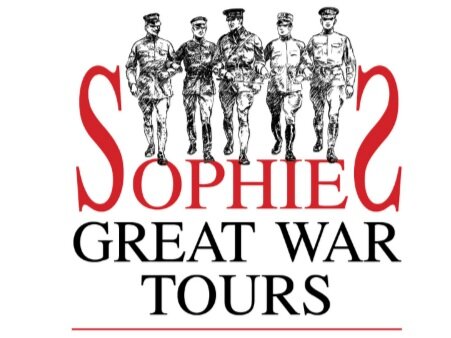Lady Dorothie Mary Evelyn Feilding-Moore MM was to become one of the most highly decorated volunteer nurses and ambulance drivers of the First World War.
She was the first woman to be awarded the Military Medal for bravery in the field. She also received the 1914 Star, the Croix de Guerre from the French and the Order of Leopold II from the Belgians for services to their wounded.
Dorothie was born on 6th October 1889 to Rudolph Feilding, 9th Earl of Denbigh and the Countess of Denbigh.
She was educated at home in Monks Kirby, Warwickshire, and at the Convent of the Assumption in Paris, where she became fluent in French. She made her debut in May 1908 at the age of 18, being presented to the King and Queen of the United Kingdom by her mother.
At the outbreak of the First World War, like so many others, Dorothie was compelled to do her bit, as did her siblings, three of her brothers and sisters would serve. Her brother Lieutenant-Commander (Royal Navy) the Hon. Hugh Feilding, was killed at the Battle of Jutland, 1916.
In September 1914, after a short training course at Rugby Hospital, Feilding travelled to Belgium where she began driving ambulances for the Munro Ambulance Corps (founded by Dr Hector Munro).
This corps, comprising a convoy of motor ambulances donated by the British Red Cross, would transport men from close to front line positions between Nieuwpoort and Diksmuide to the hospitals at Veurne (Belgium).
Although from an aristocratic background, Feilding was said to have an easy demeanour that transcended social boundaries, one that endeared her to all. Her "five o'clock teas" among the ruins of Furnes became legendary.
Dorothie's work took her to well within artillery range and therefore she was often in great danger.
She was recognised in a 'special order of the day' issued on 31 December 1914 by French Rear-Admiral Pierre Ronarc'h, commanding the Fusiliers Marins for which she subsequently received the French Croix de Guerre (bronze star). In 1916, Commander Henry Crosby Halahan, RN, Officer Commanding Royal Naval Siege Guns, wrote the following letter of recommendation to Prince Alexander of Teck, head of the British Military Mission in Belgium:
I venture to submit that Lady Dorothie Feilding should in like manner be rewarded. The circumstances are peculiar in that, this being an isolated Unit, no Medical organization existed for clearing casualties other than this voluntary one and owing to indifferent means of communication etc, it was necessary for the Ambulance to be in close touch with the guns when in action. (She) was thus frequently exposed to risks which probably no other woman has undergone. She has always displayed a devotion to duty and contempt of danger which has been a source of admiration to all. I speak only of her work with the Naval Siege Guns, but your Serene Highness is also aware of her devoted services to the Belgian Army and to the French – notably to the Brigade des Marins.
This citation ultimately resulted in Feilding becoming the first woman awarded the Military Medal for bravery on 1 September 1916 as notified in the London Gazette.
She served with the corps in Flanders until June 1917 when she returned home to marry Captain Charles Joseph Henry O'Hara Moore, MC, of Mooresfort, County Tipperary. After a brief honeymoon period, Feilding was back behind the wheel of an ambulance, ferrying the wounded around London.
I stumbled across Dorothie's grave in lockdown, one of those moments where we were finally able to go out for a walk locally. Despite living in the area for more than a decade, I had never walked around the picturesque village of Monks Kirby. I noticed a slightly shabby grave (it had picked up all the dirt that comes from being under several trees) but then I saw a detailed increspription. I went straight home to research her.
Wow! What a woman. I was drawn back to her graveside two further times in quick succession, one time placing a poppy cross.
While we often think of the combatants and what they endured in war, we must never forget those non-combatants, their contribution to saving lives, and in this case, an incredibly heroic woman who volunteered to be there.

